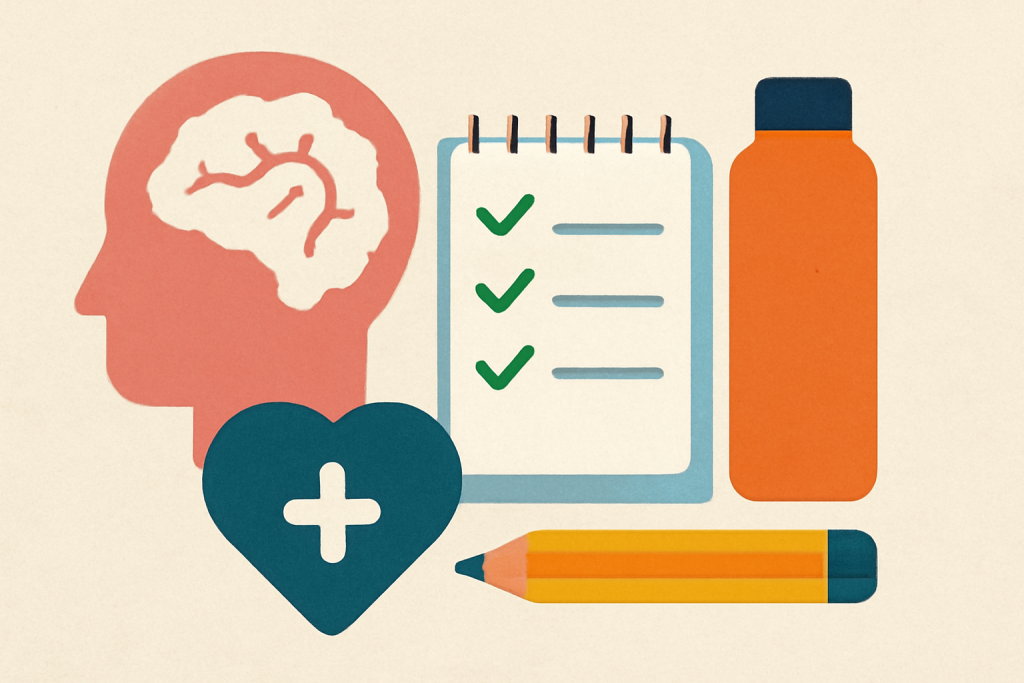Building Stronger Mental Habits Through Consistency
Jessica White August 6, 2025
Building stronger mental habits isn’t about drastic changes—it’s about consistency! In this article, we’ll explore how making small, consistent efforts can lead to lasting transformation in your mental well-being. Don’t miss out on learning how to turn your mental habits into your greatest strength.

1. Understanding the Power of Mental Habits
When we think about personal growth and improvement, many of us look for drastic solutions or quick fixes. But the truth is, sustainable transformation comes from the mental habits we form and maintain. Our mental habits shape how we react to situations, interpret the world, and ultimately affect our emotional health. A mental habit, whether positive or negative, can either strengthen or weaken our psychological resilience.
According to a study by the University College London, it takes an average of 66 days to form a new habit (Lally et al., 2010). This highlights that building mental habits is a gradual process requiring persistence. Small, consistent efforts over time compound into significant changes. The brain adapts to these habits, and soon, they become second nature, reshaping how we approach daily challenges.
2. The Role of Consistency in Mental Habits
Consistency is one of the most crucial elements in forming and maintaining mental habits. No matter how beneficial a mental habit is, if it is not practiced regularly, it won’t yield lasting results. For instance, you can’t expect to feel emotionally resilient or mentally strong by practicing mindfulness or journaling just once in a while. Instead, it’s the routine practice that solidifies the habit and leads to long-term mental well-being.
The consistency behind mental habits doesn’t just allow them to become automatic. It strengthens the neural connections responsible for these behaviors. The more frequently you repeat an action, the more robust these neural pathways become, making it easier to execute that habit without thinking about it. This is known as neuroplasticity—our brain’s ability to reorganize itself through repetition, forming new habits and patterns.
A solid example of this concept is the power of gratitude journaling. A 2016 study in Psychological Science found that writing down three things you’re grateful for daily can significantly boost happiness and reduce depressive symptoms (Emmons & McCullough, 2003). The more consistently you engage in this practice, the more ingrained the habit becomes, and the more natural it will feel to focus on gratitude rather than negativity.
3. How to Build Consistent Mental Habits
Building consistent mental habits doesn’t have to be complicated. In fact, the simpler the habit, the easier it is to maintain over time. Here’s how to build and maintain your own set of transformative mental habits:
Start Small
You don’t need to overhaul your entire mindset at once. Start with one small habit that you can easily integrate into your daily routine. For example, practicing mindfulness for just 5 minutes a day or writing down one positive affirmation every morning can lay the groundwork for more complex habits in the future.
Track Your Progress
Use tools like habit trackers, journals, or smartphone apps to stay on top of your goals. Tracking your progress helps hold you accountable and offers visual proof of your consistency. Apps like Streaks or Habitica can provide daily reminders, making it easier to stay on track. Over time, you’ll see how far you’ve come, which provides motivation to continue.
Set Realistic and Achievable Goals
Don’t overwhelm yourself with a long list of new habits to implement. Set manageable and realistic goals for each habit. This ensures that you don’t get discouraged and can enjoy small wins that encourage you to continue practicing.
Make It Enjoyable
The more you enjoy the mental habit you’re building, the more consistent you’ll be. Choose activities or techniques that resonate with you. If mindfulness feels forced, try guided meditation apps or listening to calming music while practicing. Enjoying the habit makes it much easier to stick with it over time.
4. Overcoming Challenges to Consistency
Building mental habits comes with its own set of challenges. From losing motivation to encountering setbacks, these obstacles can make it feel like your progress is stalled. However, consistency is about embracing imperfections and continuing your practice despite setbacks.
Lack of Motivation
There will inevitably be days when you feel unmotivated or overwhelmed. On these days, it’s important to remind yourself of the long-term benefits of consistency. Motivation often fluctuates, but commitment to a routine can help you push through the hard days.
One technique to combat lack of motivation is to “temptation bundle.” Pair your desired habit with an activity you love. For instance, listen to your favorite podcast while practicing journaling or mindfulness. By connecting your mental habit with something pleasurable, you enhance the overall experience.
Forgetfulness
It’s easy to forget about your mental habits in the hustle and bustle of daily life. To combat this, set reminders throughout your day. Use phone alarms, calendar notifications, or sticky notes as cues to bring your focus back to your practice. Making your mental habits a part of your daily environment can make them harder to forget.
5. The Psychological Benefits of Consistent Mental Habits
Mental habits do more than just keep us on track—they help improve our mental health by reducing stress, anxiety, and feelings of depression. The key is consistency. For example, research has shown that mindfulness practices consistently reduce anxiety, and even just 10 minutes of mindfulness a day can bring lasting improvements to your emotional health (Goyal et al., 2014).
Additionally, mental habits help build resilience—the ability to bounce back from setbacks and manage life’s challenges effectively. Resilience is not something you’re born with; it is a skill developed over time through repeated exposure to challenges. With regular practice of positive mental habits, you strengthen your ability to stay calm and composed in the face of adversity.
Moreover, habits like gratitude journaling, positive affirmations, or focusing on your strengths can shift your cognitive bias from negativity to positivity. By constantly practicing these habits, you rewire your brain to see opportunities rather than obstacles.
6. The Neuroscience Behind Mental Habits
The formation of mental habits is deeply rooted in neuroscience. Each time you repeat a habit, your brain forms and strengthens the neural pathways associated with that habit. Over time, these pathways become more efficient, making it easier to repeat the behavior without conscious thought.
This process is called neuroplasticity. By practicing mental habits consistently, you’re literally changing the structure of your brain, making new thought patterns stronger and more automatic. For example, if you regularly practice mindfulness, you’re increasing the activity in the prefrontal cortex—the area of the brain responsible for focus, attention, and emotional regulation (Schwabe & Wolf, 2013).
7. Conclusion: The Power of Consistency in Building Stronger Mental Habits
Building stronger mental habits through consistency is not an overnight process. It takes time, patience, and persistent effort. However, the rewards are well worth it. With small, consistent actions every day, you can rewire your brain, boost your mental health, and foster resilience in the face of challenges.
Remember, mental habits don’t require perfection—they require consistency. Start small, track your progress, and stay committed to your practice. Over time, you’ll notice significant improvements in your mindset and overall well-being.
References:
- Lally, P., Van Jaarsveld, C. H. M., Potts, H. W. W., & Wardle, J. (2010). How are habits formed: Modelling habit formation in the real world. European Journal of Social Psychology, 40(6), 998-1009. Available at: https://onlinelibrary.wiley.com (Accessed: 6 August 2025).
- Verplanken, B., & Wood, W. (2006). Interventions to break and create habits. Psychological Science, 17(3), 296-301. Available at: https://journals.sagepub.com (Accessed: 6 August 2025).
- Goyal, M., et al. (2014). Meditation programs for psychological stress and well-being: A systematic review and meta-analysis. JAMA Internal Medicine, 174(3), 357-368. Available at: https://jamanetwork.com (Accessed: 6 August 2025).







